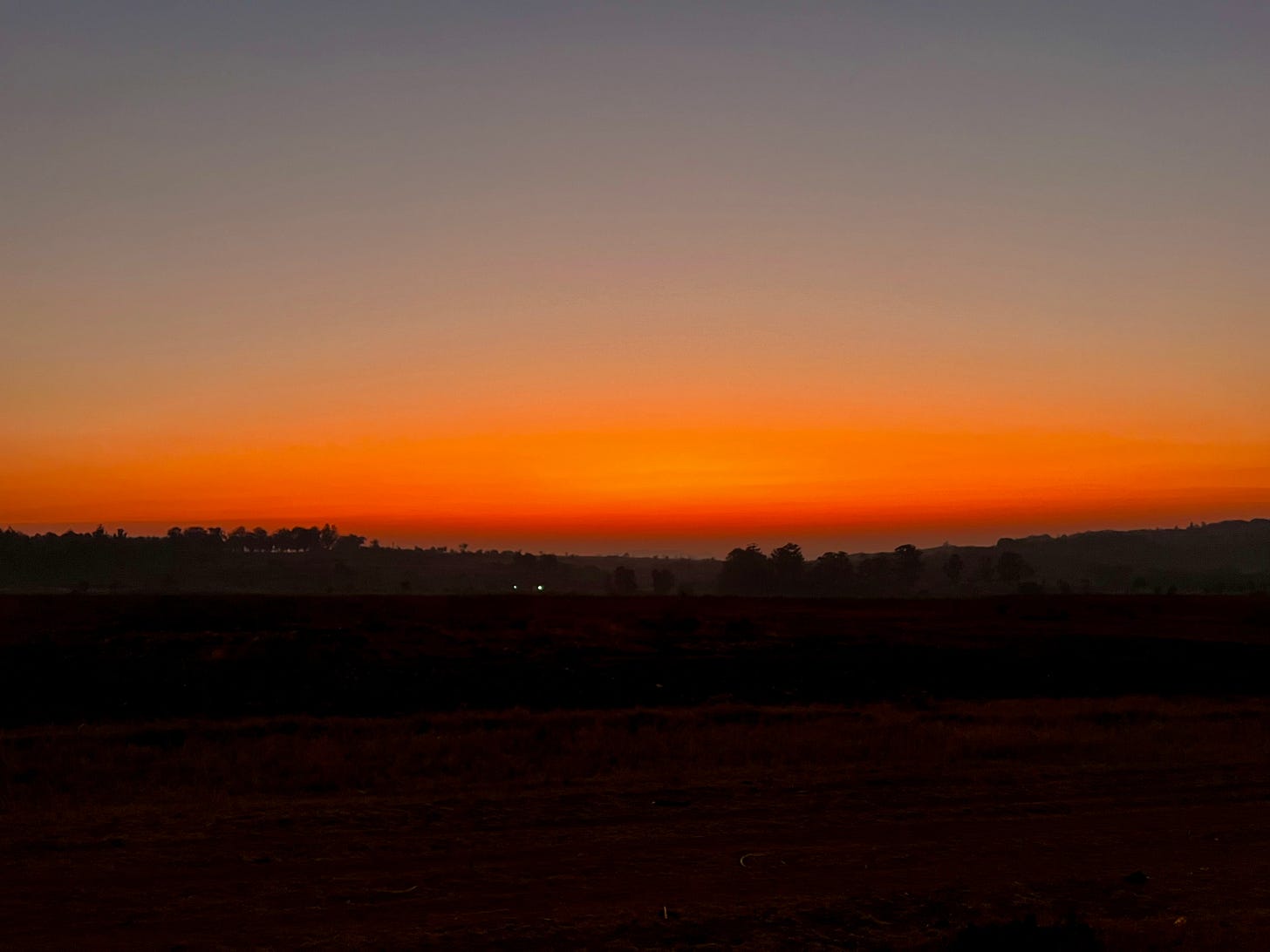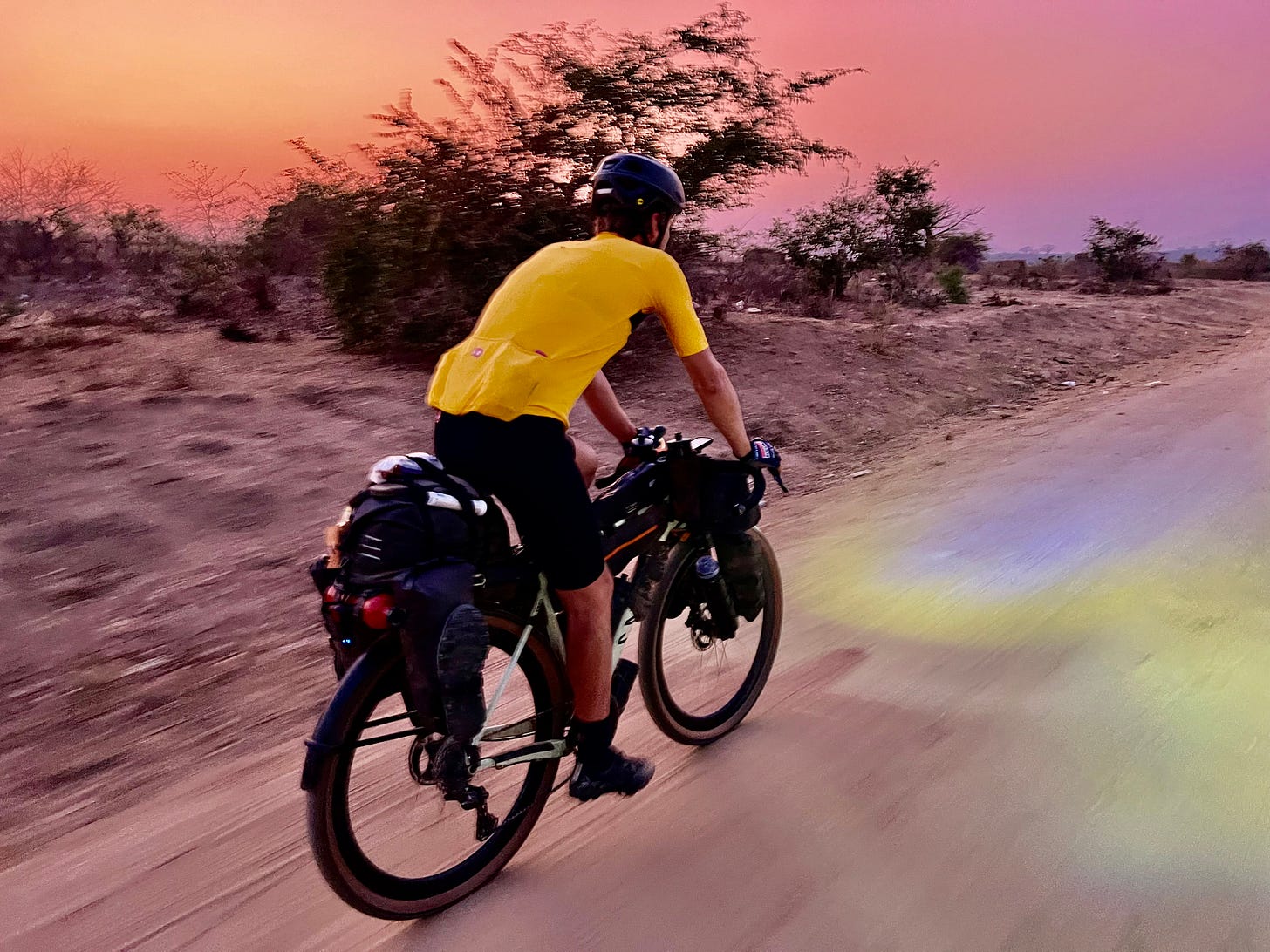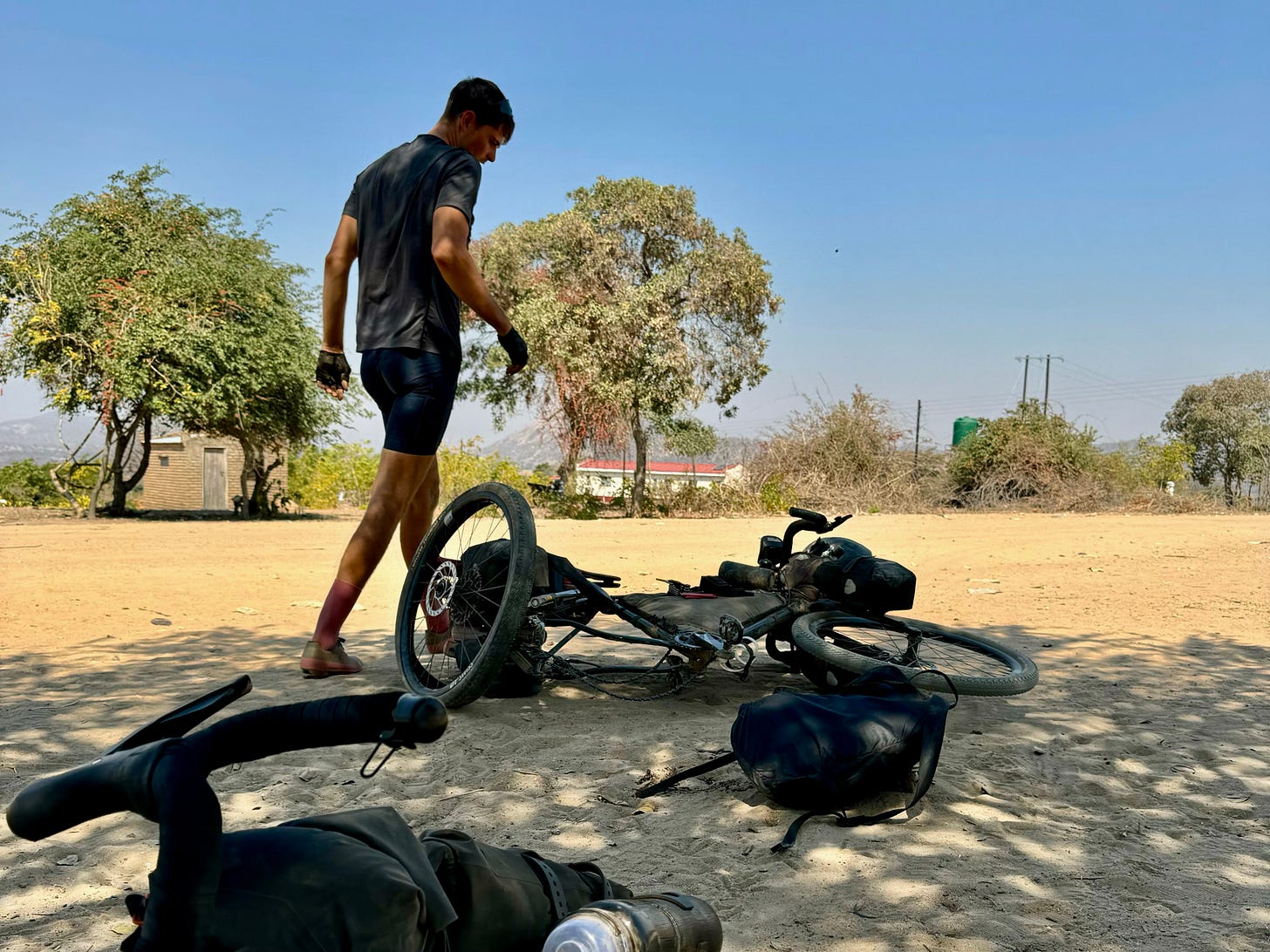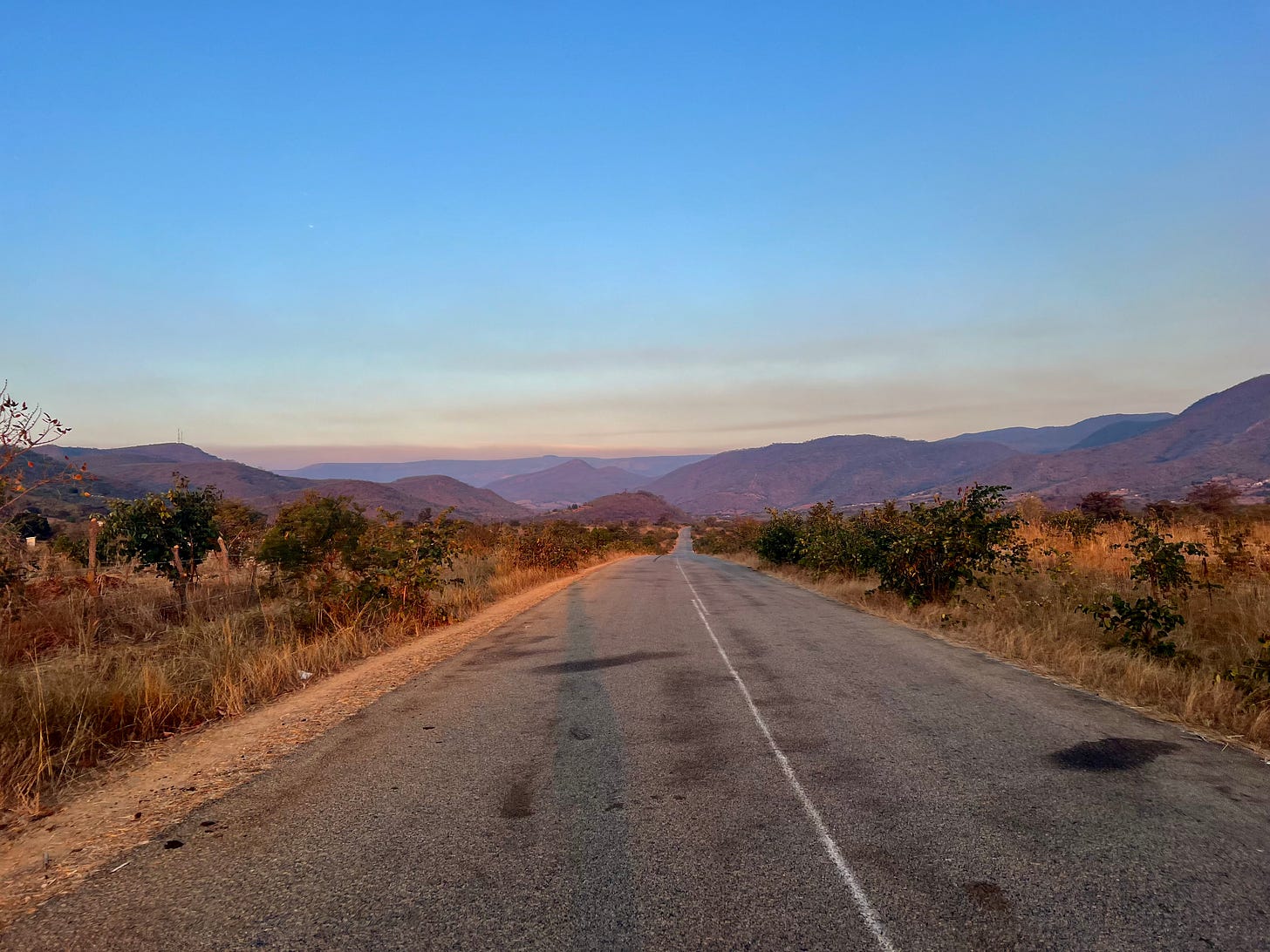By nature, I have something of a predisposition for extremes. Left unchecked, I bounce metronomically between them, demoting moderation to nothing more than a transitional phase. So, it was hardly a great logical leap to predict that, after weeks cooped up in Malawi making little to no progress, once unhobbled I’d have my sights set on some ambitious days in the saddle.
After spending the night in Lilongwe’s cheapest room—an act of essential grounding after the relative luxury of my days spent on the lakeshore—I set off at dawn for my final morning of riding on Malawian soil. This turned out to be true in the literal sense, given that most roads in Malawi are more arable than rideable. I crossed into Mozambique at about midday, and found myself caught in the web of border bureaucracy until late afternoon. Once released, I pushed on until dark, rolling into Ulongwe, a small town in northern Mozambique, just as I lost the last of the light, and my tyre, which had been slowly surrendering its sturdiness all afternoon, lost the last of its air. There, in a state of dazed exhaustion from the day’s effort, I withdrew some Meticals from the local bank, and, by way of a gratuity, let the machine swallow my only card. I went about my evening in blissful ignorance of this fact, and spent the night in another modest guesthouse before setting off at 5am for the next day’s ride. This ride promised to be extreme even by my own skewed standards, but it wasn’t simply an act of aimless masochism. I was on the hunt for a friend.
Since Kenya, I’d been in contact with a Dutch cyclist, Thijs, who was tracking a fairly similar route to me, only a month in advance. In Malawi, he’d slowed down and cycled with his dad, who’d come out to join him; in Tanzania, I’d sped up, thanks to my various methods of motorised assistance; and, in the extra week it took for the folks at UPS to read International Shipping for Dummies and implement its advice, our schedules had finally synchronised.
Riding together was something I was particularly keen to do, not only because I felt very comfortable in the company of Dutchies—thanks to my years at TENZING surrounded by a horde of them—but also because Thijs was covering ground fast. Very fast. In fact, on those rare days in East Africa when I was travelling briskly enough to bag a Strava Top 10, I’d invariably find a single name atop that list. Thijs Pankras. He seemed to be moving at a blistering pace, and this speed held sparkling appeal. My need to cover big distances was, in part, a reaction to the slower pace of recent weeks, but it was also evidence of a creeping desire to get this thing over and done with.
I’d now been on the bike for eight months, and the pure exposure—a salient feature of the last month in particular—had begun to wear me down. Each obstacle I’d faced in this time, however good it felt to overcome, also seemed to drain just a little more energy than I’d ever regain. From the hefty Kenyan tax bill and the uncertainty of its delay; to the country's protests and our subsequent ostracism; to the broken back wheel and its failed replacement; to losing one riding companion, then another; to settling in to the reality of solo riding once more; to the untimely end of yet another wheel, and crossing Tanzania by any other means than by bike; and, finally, to the two weeks of waiting and wondering if this trip had reached its immutable conclusion, it had been anything but smooth sailing. Granted, this paints a rather pessimistic picture of events, one that omits the generosity, community, spontaneity and friendship that emerged alongside the challenges. But throughout, I’ve felt like a surfer knocked down by a wave who comes up, gasping for air, only to be submerged once again by the next. The imagined ease of life beyond was alluring. And there seemed to be one surefire way to reach it: ride hard.
The prospect of time with Thijs felt like a golden ticket. Two birds, if you like: progress and company. But first, I had to reach him. 230 kilometres lie between Ulongwe and Tete, our meeting point. A quick glance at the elevation profile bore good news: it seemed that the road declined steadily from start to finish. However, after spending a perplexing morning cycling uphill, I realised that over such distances, even substantial climbs become mere blips in the day’s metadata, creating a false impression of an easy cruise. Thankfully, Thijs’ route—a ride of far more sensible proportions—converged with my own at about the midway point. So, after the morning’s hard effort, a welcome sliver of magic crept into my afternooon’s ride.
When I was a tot, my grandma would sneak into the woods beside her house and hide egg cups full of sweets in the undergrowth for us. Having been spun a yarn of questionable veracity about the origin of these treats—something which, as I remember, rested on the axiomatic existence of goblins—we would then traipse around after dark to find them. With, it must be said, a good deal of assistance from the gamemaker, we’d discover the egg cups perched on low branches, nestled in rotten logs, and even—to add some weight to the goblin myth—hiding under toadstools.
But it would appear that goblins aren’t confined to the suburban woodland of the West Midlands. Mid-morning, I received a cryptic message from my Dutch friend, who at that point was two hours ahead. The message included a landscape picture with a circled bush, a close up of said bush, and a caption: Breadcrumb One. Just after lunch, I arrived at this intriguing scene and set about locating the bush. Once I’d found it, I took a quick lap and discovered a small cairn. As I removed the stacked stones, the corner of a package emerged, and, as I excavated further, a veritable treasure trove of sugary delights emerged.
From that point, every 30 kilometres I’d de-code a clue from Thijs only to discover the next nutritional nugget—from oral rehydration solution, to Clif energy blocks, to gummy worms. The final clue was left with the gate guard of that night’s campsite. I was told to recite a phrase on arrival—one not quite in keeping with my typical spirit of self-deprecation—and see what happened. Arriving at the gate late that afternoon, I mumbled, slightly reluctantly, I am a machine. The guard bowed dutifully and plucked a small bottle of London Dry Gin from his jacket pocket, a nod to my misdeeds at Kenya’s Eel Hotel. Well played, Thijs, well played.
Thijs is a data analyst by trade—something that’s apparent from one glance at his bike. The thing bristles with technology. As we examined one another’s steeds—the courting ritual among any touring cyclists that meet for the first time—I scurried around, eagerly quizzing him on the various gadgets and gizmos that adorned the whole arrangement. After he’d shown me the GPS, power meter, heart rate monitor, and radar rear light—a nifty device that sends alerts of approaching traffic to his head unit—I pointed at a small rubber ring attached round the hub of his front wheel. And what’s that? I asked. Oh that? Thijs said, that’s a speedometer. I frowned. But doesn’t your GPS already give you the speed? Not accurately enough, The Analyst replied.
That evening, we got down to business, spreading the metaphorical maps across the table. From what I’d seen of Thijs’ stampeding progress, I’d begun to suspect he was a serious rider. These suspicions were soon confirmed as stories surfaced about feats like his 500-kilometre, 24-hour ride from Amsterdam to Paris, or his annual 200-kilometre mountain bike ride through the wet, wintry farmland of northern Holland. Not only a rider, Thijs is also a racer. He’s competed both on and off road across Europe, and even made it to the Gran Fondo World Championships—a single-day road race of the top amateur riders from across the globe—where he placed in the top third.
His attitude to riding reflects this. By his own admission, Thijs is competitive. In fact, one of the reasons he’d been racking up Strava accolades was a result of this streak—he’d programmed his GPS to alert him to upcoming segments and would go all out when they arrived, aiming to take the top spot. It was just this commitment to competition that I hoped to leverage. In my eagerness to cover ground, I’d spotted some opportunities to expedite Thijs’ planned route, and I hoped that, by providing a pacier alternative, I might be able to goad him into accepting the challenge.
On our rest day in Tete, we loaded up on fuel for the days to come at a shopping mall. Here, Thijs displayed his racer’s commitment to marginal gains, placing each item under intense scrutiny before accepting or rejecting it from his basket. The forensic examination of each packet’s nutritional content would often be followed by a decisive declaration of exactly how long it could sustain him in the saddle. As I aimlessly wandered the shop floor to choose my own haphazard haul—decisions I based almost entirely on the irrational grounds of taste and preference—I’d hear the occasional evidence of Thijs’ calculations echoing through the aisles. …one serving…60 grams…60 over 80…that’s 45 minutes.
The next day, I woke a little apprehensive for our first day in the saddle together. By proposing the quicker plan, I’d set the bar high and worried that, in the pressure of company, it was a level I’d be unable to live up to. While I’d hoped to leverage this pressure to commit Thijs to this plan in the first place, I suddenly realised that, in doing so, I may have inadvertently lit a fire beneath the stronger cyclist and taken the legs out from under the weaker one. In the crucible of competition, Thijs seems to turn it on—whatever it is—whereas I, historically, do quite the opposite. I crack, I crumble, I sink into an amorphous jellied mass on the floor. It’s really quite a pain. There’s no better example of this than in pub pool. During a friendly game, on a good day, I can be half decent with the cue. But as soon as a crowd gathers or the game becomes significant, I go from a baize boy-wonder to Stevie Wonder in a flash. No doubt Stevie’s a great musical talent, but I wouldn’t peg him as too formidable on the felt.
However, by the end of the first day, I remained as yet un-jellied. The climate of Mozambique, whose low-lying plains trap the heat, had been a helpful ally. Given the resistance I’d built to such challenges since the infernal riding of West Africa, the slow-roasting levelled the field and we rode in happy tandem towards the Zimbabwean border. But the day’s ride was only an appetiser. A tougher adversary lurked in the wings. We crossed the border into Zimbabwe with relative ease and pitched up at Ma Jo’s, the only available accommodation in town.
The first red flags staggered over as we arrived, greeting us with drunken familiarity. Thankfully we were rescued by the arrival of some staff who showed us to the available rooms. These were tough by any standard, but particularly so for Thijs, who’d spent the majority of his trip so far in altogether classier joints. For a seasoned cheapskate like me, the rooms struck a less shocking visual, but they still remained within the lower bound of what I’d consider an acceptable night's kip. Having suffered through several disturbed nights at the hands of Uganda’s top DJs, I made a point of asking what time the music of the adjoining bar was switched off. 8pm, I was told resolutely. That would do.
At 10.30pm, I pulled on some shorts and stormed into the blaring fray. The crowd that had, when we arrived, been little more than a motley crew of daytime drunks, now appeared to include a significant portion of the town’s male population, who all seemed a little stunned by the sight of a pale white torso striding brusquely across their bar. After employing the usual opening arguments to the woman in charge, I readied myself to slip into the familiar mire of circular debate. To my complete surprise, however, the woman simply walked away, opened the till, and took out a handful of bills, thrusting our night’s pre-paid rent back into my hand. Result! Never in all my clashes with the continent’s establishments had victory come so easily. I uttered a mumbled thanks and walked back to my room to locate something I could use to plug my ears.
And that, I thought, was that. I failed to sleep for a little while longer before I heard a drunken commotion outside my window. Then came the banging on the door—a flimsy barricade which, even if it’d had hinges, would’ve no doubt been hanging off them. I ignored the intrusion, brushing it off as the behaviour of a few of the bar’s livelier locals. But the ruckus continued. After half an hour of this, the door looked fit to burst, so, slipping my penknife into my back pocket, I inched over and cracked it open, blocking any further access with my foot. At the door stood the woman from the bar, flanked by three inebriated henchmen. She explained, in no uncertain terms, that if we were occupying her room, we had to pay; if we were unhappy with the service, then we could leave; but there’d be no inbetween, or else the police would be called. I inquired, rather impolitely by this point, about where the hell we were expected to go in a town with one guesthouse at close to midnight, to which she reiterated option three. Not fancying a run-in with the law while still half-naked, I thrust the cash defiantly through crack and barricaded the door once more.
At 5am, our alarms went off—a rather redundant formality given that, by that point, we’d been up for hours already listening to the fanfare of honks produced on arrival by the local buses. Bleary eyed, we kitted up and set off. The day’s adversary swaggered onto stage and flashed us its cards: 160 kilometres—a century in old money—with over half of that distance on gravel. Then there was the small problem of mines. The gravel road that runs parallel to the border with Mozambique picks its way through an active minefield, an explosive hangover from the Zimbabwean war of independence between the white nationalist rulers of Rhodesia, and the freedom fighters of the Peoples Union and the National Union. By now, a good proportion of the minefield has been mapped, with safe tracks marked throughout by wooden stakes. The only problem? Each time the rains arrive—a twice-annual tradition in Zimbabwe—the ground shifts and the mines migrate. And there’s no prizes for guessing when we were arriving.
Despite the nagging detonative concern, however, the day began without a hitch, and we were greeted by an astounding sunrise. Though this short spell of good luck lasted all of about five minutes before deserting us for good. Seemingly unaffected by the night’s deprivation, Thijs had set off at a characteristically brisk trot. In an imprudent attempt to keep pace, I hit a pothole, hard, and burst my tyre. Luckily, while I changed the flat, the sun got a move on, so by the time riding resumed, I could at least see where I was going. This small mercy did little more than reveal the architect of our discomfort. The surface was horrendous and the battering of body and mind was brutal in equal measure. By midday I was about sick of cycling altogether, a sentiment for which the universe rewarded me with another puncture. As I huffed and puffed, taking a heavy-handed approach to the repair, I noticed the extent of the damage caused by the morning’s pothole. My brand new back wheel, which had negotiated the challenges of international customs, been ferried halfway across the globe, and eventually reached me via several anointed hands, had been defiled once again by Africa’s unforgiving crust.
Luckily, for my replacement, I’d chosen a wheel of such substance that it’d take a land mine to damage irreparably—and our luck couldn’t be that bad, could it? It would still take me the distance, but I wear Madonna’s scars as my own, and seeing her battered and bruised shakes my own foundations. Feeling a force-10 tantrum brewing, I urged Thijs to carry on alone while I fixed the puncture and replaced the back tyre with my bombproof spare. This, reluctantly, he did, though not before attempting to convince me otherwise. To his very reasonable arguments—you know: no phone service, active minefield, evening drawing close…that kind of thing—I spat a terse reply that I’d made it this far alone, hadn’t I? It was a fairly unassailable point, so Thijs saddled up and rode on.
Once I’d fixed that puncture, I staggered quickly on to the next, which exhausted my supply of spare tubes. The afternoon sun beat down relentlessly and I cursed the coarse ground beneath my wheels. I cursed my hubris—the force that had driven me to suggest such a ludicrous schedule in the first place. I cursed the serpent of competition that had impelled me to ride beyond my means and damage my wheel in the process. And I cursed the day that marched relentlessly on, sucking the light from my future and banishing me to the shadows of night. But, for all the cursing, I continued to ride. If there’s one thing I’ve learnt to do in the moments of upheaval of the past months, it’s to take an emotionally secular approach to the task at hand. Even in the throes of a substantial sulk, I can cut myself in half: wherever the mind goes, the legs keep turning.
Thanks entirely to my legs—and with no help at all from my mind—with 50 kilometres still to ride, I reached tarmac. From here, I put the hammer down, keen to give the shadows of night a run for their money. This tactic proved successful until the final challenge approached: a sheer wall of a pass, soaring 1000 metres up from the valley floor. Just as I stood on my pedals, ready to settle into a calm and consistent cadence for the climb ahead, the object of my speedy flight shifted as a raging bull burst from an adjacent field out onto the road. I screamed and stamped on the pedals with my last reserves of energy, hauling Madonna up and over the ramp ahead and onto the flat beyond where I could escape to safety. As if mirroring my own depletion, the light chose this moment to croak, and my back tyre too gave up the ghost. I was out of light, out of spares and out of energy. And with that, I was shit out of luck.













Where is Jake? Is all ok? Radio silence for the past few weeks
Heck Jake, that sounds enough to break any one's patience, let alone test it! Hope things start looking up again soon x